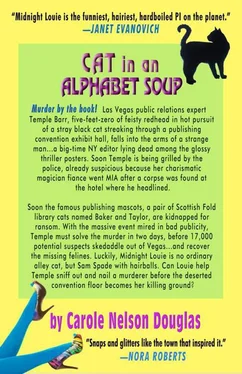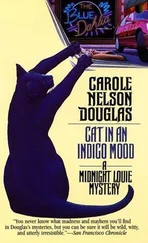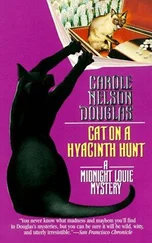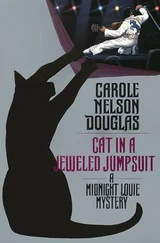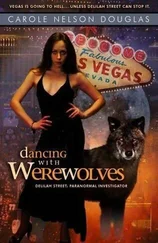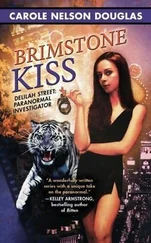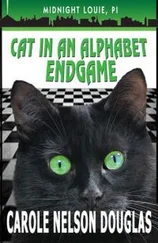Carole Douglas - Cat in an Alphabet Soup
Здесь есть возможность читать онлайн «Carole Douglas - Cat in an Alphabet Soup» весь текст электронной книги совершенно бесплатно (целиком полную версию без сокращений). В некоторых случаях можно слушать аудио, скачать через торрент в формате fb2 и присутствует краткое содержание. Год выпуска: 2013, Издательство: Wishlist Publishing, Жанр: Старинная литература, на английском языке. Описание произведения, (предисловие) а так же отзывы посетителей доступны на портале библиотеки ЛибКат.
- Название:Cat in an Alphabet Soup
- Автор:
- Издательство:Wishlist Publishing
- Жанр:
- Год:2013
- ISBN:нет данных
- Рейтинг книги:3 / 5. Голосов: 1
-
Избранное:Добавить в избранное
- Отзывы:
-
Ваша оценка:
- 60
- 1
- 2
- 3
- 4
- 5
Cat in an Alphabet Soup: краткое содержание, описание и аннотация
Предлагаем к чтению аннотацию, описание, краткое содержание или предисловие (зависит от того, что написал сам автор книги «Cat in an Alphabet Soup»). Если вы не нашли необходимую информацию о книге — напишите в комментариях, мы постараемся отыскать её.
Cat in an Alphabet Soup — читать онлайн бесплатно полную книгу (весь текст) целиком
Ниже представлен текст книги, разбитый по страницам. Система сохранения места последней прочитанной страницы, позволяет с удобством читать онлайн бесплатно книгу «Cat in an Alphabet Soup», без необходимости каждый раз заново искать на чём Вы остановились. Поставьте закладку, и сможете в любой момент перейти на страницу, на которой закончили чтение.
Интервал:
Закладка:
“Fine. I’ll buy.”
They threaded through the crowds, Temple making sure that her catch remained in tow. As the woman had said, seats were available in the vast eating area. They shuffled through the cafeteria setup, Temple suddenly ravenous after her nonlunch. She splurged on a sweet roll and gaped when Rowena Novak ordered an honest-to-God Coke, no diet version.
As they hunched over their trays at a round white table, people came and sat and left all around them. In one way it was the worst site for a probing interview, in another the best. The casual atmosphere and crowds made it seem that nothing serious could be said here, so of course it would be.
“What do you need to know?” Rowena Novak took a quick sip of her Coke.
“It’s still hard to explain to Lieutenant Molina what an imprint is, how someone gets started in the business. You were married to Chester Royal for—?”
“Seven years, an appropriate number, like a plague of Egypt.”
“Was that before—or after—the formation of Pennyroyal Press?”
“Oh, before. Chester was writing nonfiction then.”
“Really?”
“That’s how I met him. An agent was enthusiastic about a proposal of his. Of course in nonfiction the author’s salability is as important as the book’s.”
“You mean, whether the author’s good-looking, articulate, will do well on media tours, that kind of thing?”
“Exactly.”
Nothing more was forthcoming except another of those tiny, birdlike sips. Temple munched a mouthful of sinfully sugared pastry. How to keep the interview going before Rowena Novak suddenly finished her Coke and walked away?
“So Mr. Royal, Chester, went from author to editor. That must have been after you’d married.”
“Yes. He became interested in the other end of the business after we’d met and begun—I suppose you’d call it dating.”
A flicker of disgust in those ocher eyes told Temple that despite the woman’s enviable composure, much that was unpleasant lurked beneath.
“I understand Chester Royal was the marrying kind.”
“If you’re asking which wife I was—it was number three. And Chester was not so much the marrying kind as the exploiting kind. If a woman came along he could use, he married her. At least he did when he was younger.”
“He didn’t marry Mavis Davis.” Temple issued a frank glance.
Rowena’s mouth quirked. “No. He’d figured out how to use women without marrying them by then. He owed it all to me.”
“Did you tell this to Lieutenant Molina?”
“No.”
“Why are you telling me?”
“Because you’re asking the right questions. I have nothing to hide about our lives together, about what he was. I don’t even hate him anymore, I just understand him. I probably understand—understood—Chester better than anybody. I taught him all he knew.”
When Temple stared at her incredulously, she added, “accidentally, of course,” and went on. “I’d never been married before, but I was no kid. I might have resisted Chester, but he was so fascinated, so enthralled by my work. At the time it seemed to mean that he took me seriously. What he took seriously was my work; he took my work.”
“Took your... work? How?”
“He absorbed it. He became what I was.”
Temple, still confused, searched for the right next question.
“Have you ever been betrayed in love, Miss Barr?”
It was a no more personal question than Temple had been asking. “Yes,” she answered with fierce honesty. “I think.”
Rowena laughed, a pleasant sound and an expression that did pleasant things to her plain face. “I can’t say I was disappointed in love, but I was betrayed in my judgment. I failed to see that it wasn’t I to whom Chester was so earnestly attracted, it was something I had.”
“What?”
“Power.”
Temple didn’t know what to say. Claudia’s press release had described Rowena Novak as a senior editor at Trine Books, not a bad position, but certainly not one that would put her into a corner office in Manhattan.
Rowena’s fingers, sallow and ringless, moved up and down the sides of the oversize Styrofoam cup as if they were caressing Baccarat crystal. Her face softened with rueful recollection, reflected a sadness at the ways of the world, at what she had been and Chester had done.
“He saw me edit, that’s all. He saw how careful I was in phrasing revision letters to my authors; he saw me worry when I couldn’t offer them the money, and support I thought their work deserved; he saw them trust me and depend on me. He saw how a good editor—and I was, am, a good editor—nourishes the literary ego, encourages it to stretch to produce the book it hopes to. He was fascinated by how my authors confessed their troubles—money, marriage. Writing books is a long, lonely business. Authors hope to find an editor who will listen through it all, though they seldom do today. Editors are itinerant midwives now, sometimes leaving a house in mid-contraction, unable to invest their own ego in an author or a work they may never see through to the end.”
“And Chester took what he saw you doing, twisted it, and became a bad editor.”
“A destructive one, rather. He didn’t do it consciously. You must remember he had started as a doctor, in the days when physicians were demigods. Patients came to him with their ills and insecurities extended, like an aspiring writer presenting a sickly manuscript. Through all the years, he had missed that position of power, of judgment.”
“Then why did he quit practicing medicine?”
“He had to. Can’t you guess?”
“No,” Temple admitted.
“Malpractice. He lost the suit, lost his license. Lost his power. He never really found himself again, until he met me and saw that there was another way to wield power over people’s lives and make money at it. Best of all, he discovered the medical thriller, so he could have it all back in a sense.”
“You give me the shivers. He sounds like a villain in one of his own books.”
“Oh, no.” Rowena smiled. “No. You will find few villainous doctors in Pennyroyal Press books. Only Owen Tharp could get away with doing that occasionally, for some reason. What you will find in a Pee-R Press book are whining, incompetent, crazy, homicidal nurses. You will find demanding patients and pompous, worthless hospital administrators, especially if they’re women. But you will rarely find ignoble doctors.”
“Remind me to skip reading a few. Claudia said Chester called Lorna Fennick a ‘press-release-pushing ball-busting broad.’ He hated women?”
Rowena nodded. “So deeply that he didn’t consciously admit it.”
“Why?”
“Only Chester really knew. He seldom spoke about his family, but I gather that he felt humiliated in grade school by the women teachers.”
“That warped him on women for life?”
“Maybe.” Rowena smiled. “I remember him grumbling more than once that a man used to be able to get away from women in medical school....” She sighed. “He never had been a prepossessing man; dates couldn’t have come easily when he was young. Maybe that’s why he went through five wives later: to prove he could do it. After our marriage, I realized that he feared losing part of himself in the face of women’s competence. That’s why Lorna couldn’t work for him for long.”
“Lorna Fennick worked for Chester Royal?”
“She was his editorial assistant when he first began packaging for Reynolds-Chapter-Deuce. She never married him, but she’s another victim of the Chester Royal School for Women, as is Mavis Davis.”
“What about his male authors—did he abuse them, too?”
“A raging thirst for power will consume any kind of fuel, but, no, it never bothered him to see another man get ahead as much as it did a woman.”
Читать дальшеИнтервал:
Закладка:
Похожие книги на «Cat in an Alphabet Soup»
Представляем Вашему вниманию похожие книги на «Cat in an Alphabet Soup» списком для выбора. Мы отобрали схожую по названию и смыслу литературу в надежде предоставить читателям больше вариантов отыскать новые, интересные, ещё непрочитанные произведения.
Обсуждение, отзывы о книге «Cat in an Alphabet Soup» и просто собственные мнения читателей. Оставьте ваши комментарии, напишите, что Вы думаете о произведении, его смысле или главных героях. Укажите что конкретно понравилось, а что нет, и почему Вы так считаете.
